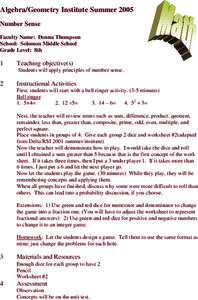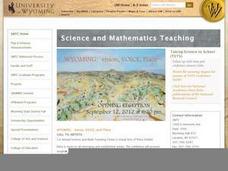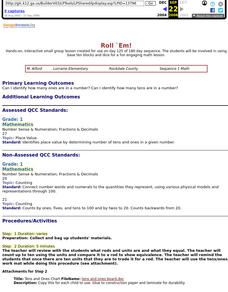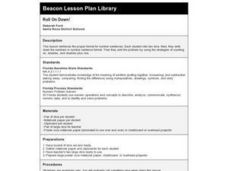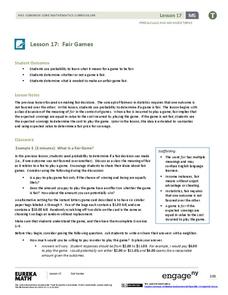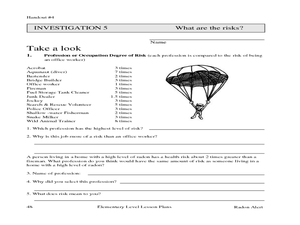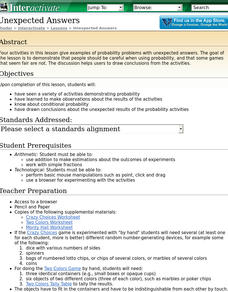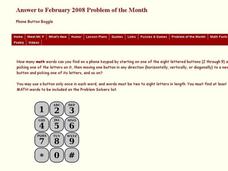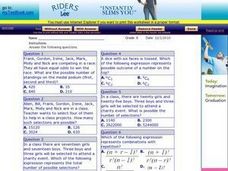Curated OER
Number Sense
Eighth graders participate in a lesson that is concerned with reviewing basic math concepts using the four operations. The activity is composed of a math game that is played by them.
Curated OER
What Are The Odds?
Students read the book, Jim Ugly, and discuss whether the odds were in favor of or against the character Jake finding his dad. They demonstrate an experiment involving odds by keeping a tally of how many times a colored die is pulled out...
Curated OER
Probability Plus
Students participate in a variety of activities to understand statistics. They collect and interpret data. Also students distinguish the difference between a population and a sample. They make inferences and create arguments using data.
Curated OER
Make the Highest Total
Sixth graders predict the outcome of a simple probability experiment, test it and explain the result by using problem solving strategies to explore situations mathematically. They then play a few games informally where students play in...
Curated OER
Roll `Em!
First graders engage in using base ten blocks and dice for a fun engaging math lesson. They use a worksheet imbedded in this lesson as the game board to help them play this math game.
Curated OER
Take A Chance Or Two
A two-part lesson immerses young statisticians in the concept of probability. On the first day, will conduct experiments with a two-colored coin and learn how to write probabilities as fractions, ratios, and percentages. In the second...
Curated OER
Roll On Down!
Pupils create number sentences by rolling two dice. Each student rolls the dice and writes down the numbers in number sentence format. Then they add the problem by using the strategies of counting on and doubles.
Curated OER
Double Sixes
In this algebra activity, students are given the challenge of determining how many times they would have to throw the dice to 'up' their chances of throwing double sixes. The problem is solved and fully worked however, it would be a...
Curated OER
Fair Games
Fifth graders examine the statistics of playing games. Many games of chance and activities in maths text books involve rolling two dice and combining the scores, usually by addition. Students often find the probabilities of such events...
Curated OER
Radon Alert: Understanding Odds
In this radon alert: understanding odds worksheet, 5th graders predict results of rolling dice and record data in a chart, then compare odds of events and occupations, then compare that with radon exposure.
Curated OER
Unexpected Answers
Students consider probability problems with unexpected and surprising answers.
Curated OER
Phone Button Boggle
In this phone button boggle worksheet, learners identify the number of math words they can find on a phone keypad according to given directions. This one-page worksheet contains one problem. Answers are provided.
Curated OER
Rolling For Value
Young scholars participate in a lesson to comprehend the concept of probability while rolling dice. They recognize patterns while making observations and recording the data for each roll. Students also review place values while playing a...
Curated OER
Creating a Bar Graph Using a Spreadsheet: Dice Rolling Probabilities
Tenth graders explore the concept of spreadsheets. They create a simple spreadsheet and chart from given data. Students perform basic formatting procedures on their chart. They use spreadsheet functions to perform calculations.
Curated OER
What Are the Risks?
Young scholars use dice to determine the risk of being exposed to radon. They practice using new vocabulary related to probability and ratios. They make predictions about the results and record their observations.
Curated OER
Counting Principle
In this counting principle instructional activity, students solve 10 problems by applying the counting principle to each one. First, they determine the number of possible outcomes in a coin toss. Then, students the number of different...
Curated OER
Tree Diagrams
In this tree diagram worksheet, students read story problems. From the given information, they draw tree diagrams to determine the total possible number of outcomes. This one-page worksheet contains ten problems.
Curated OER
Combinations & Permutations
In this combination and permutations instructional activity, learners identify possible outcomes. They determine if the given situation is a combination or permutation and solve accordingly. This one-page instructional activity...
Curated OER
The Fair Factor
Students participate in playing many games to determine if they are fair or not. They create their own game that is fair to play with their classmates.
Curated OER
Statistics and Probility
Seventh graders collect data and make predictions. In this geometry lesson, 7th graders work in tiers collecting data and plotting it. They make inferences and predictions about their collected data.
Curated OER
Rules of Sign Change
Students manipulate negative and positive numbers. In this integers lesson, students move through three activities exploring negative and positive whole numbers. A number line, cardboard function representation, and solving expressions...
Curated OER
Making Learning a Game
A game lesson can be a way to explore a variety of concepts with your students.
Mathigon
Mathigon: Probability and Discrete Math: Predicting the Future
This lesson focuses on probability theory for predicting the outcome of flipping a coin, and then flipping it multiple times.
Math Is Fun
Math Is Fun: Activity: An Experiment With a Die
Explore probability with this dice experiment. Includes instructions for recording data on a table, creating a graph, questions to investigate, a probability formula, and a discussion of probability.


